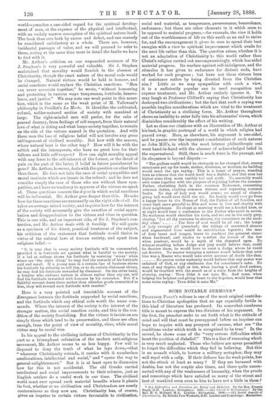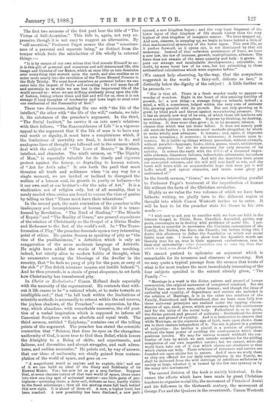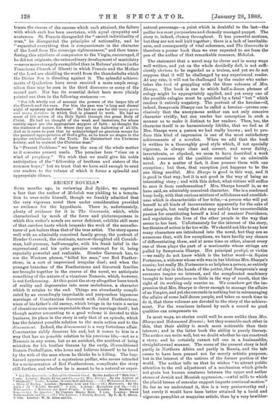SOME NOTABLE SERMONS.* PROFESSOR PAGET'S volume is one of the
most original contribu- tions to Christian apologetics that an age especially fertile in this kind of literature has produced. Its somewhat cumbrous title is meant to express the two divisions of his argument. In the first, the preacher seeks to set forth what is the attitude of mind and will that must be presupposed before an inquirer can hope to inquire with any prospect of success, what are "the conditions under which truth is recognised to be true." In the second, he shows some of the "very serious difficulties which beset the position of disbelief." This is a line of reasoning which is very much neglected. Those who believe are never permitted to forget the difficulties which they feel in believing. But this is an assault which, to borrow a military metaphor, they may well repel with a sally. If their defence has its weak points, has not the attack at least as many ? If they are harassed with doubts, has not the sceptic also times, and these quite uncon- nected with any of the weaknesses of humanity, when the proofs and reasonings which have satisfied so many of the wisest and best of mankind seem even to him to have not a little in them ?
• (1.) Difficulties and Faculties for Belief and Disbelief. By the Rev. Francis Paget, D.D. London Rivingtous. 1887.—(2.) Christ or Ecclesiastes? By the Rev. H. S. Holland, M.A. London : Rivingtons. 1888.—(3.) Social Aspects of Christianity. By Brooke Foss Westcott,D.D. London and Cambridge: Macmillan.
The first two sermons of the first part bear the title of "The Virtue of Self-Assertion." This title is, again, not very ex- pressive, though it is not easy to suggest an alternative. By "self-assertion," Professor Paget means the clear "conscious- ness of a personal and separate being," as distinct from the
temper which finds the satisfaction of life wholly in external things :— "It is by means of our own selves that God reveals Himself to us: it is this gift of personal and conscious and self-determined life, this image and likeness of our Maker, which at once lifts us into dominion over everything that moveth upon the earth, and also enables us to enter more nearly into the revelation of the Three Blessed Persons in the Holy Trinity. We must know ourselves as personal before we can enter into the import of God's self-revealing: He will seem far-off and uncertain to us while we are lost in the impersonal life of the world around us : when we are drifting aimlessly along upon the tide of fashion, letting others think and feel and will for us, then it is not strange if hazy thoughts of tendencies and laws begin to steal over our confession of the Personality of God."
These two discourses, dealing the one with "the life of the intellect," the other with "the life of the will," contain, we take it, the substance of the preacher's argument. In the third, " The Social Instinct," he carries it on into men's relations with their fellows. "The Reasonableness of Life" is a vigorous appeal to the argument that if the life of man is to have any real worth or dignity, it must have a completeness which, if the limitations of mortality are final, is denied to it ; and analogous lines of thought are followed out in the sermons which deal with the subject of "The Love of Beauty" in Nature, intellect, and character. The ninth sermon, on "The Dignity of Man," is especially valuable for its timely and vigorous protest against the heresy, so degrading to human nature, of "Art for Art's sake." It sets forth the peril that must threaten all truth and nobleness when "in any way for a single moment, we are invited or inclined to disregard the welfare of a human soul, its growth in purity or holiness—be it our own soul or our brother's—for the sake of Art." It is a vindication not of religion only, but of all morality, that is sorely needed when critics are found to excuse the vices of genius by telling us that "Titans must have their relaxations."
In the second part, the main contention of the preacher is the inadequacy and incompleteness of human life till it is trans- formed by Revelation. "The Need of Healing," "The Miracle of Repair," and "The Reality of Grace," are general expositions of the relation of Christianity as the Gospel of a Divine Healer and Redeemer to the fact of the world's evil. In "The Trans- formation of Pity," the preacher descends upon a very interesting point of ethics. He quotes Seneca as speaking of pity as "the vice of the pusillanimous," a definition which is only an exaggeration of the more moderate language of Aristotle.
He might have added the words of Virgil, less revolting, indeed, but utterly alien to modern habits of thought, when he enumerates among the blessings of the dweller in the country, that "he feels no pang of pity for the poor, or envy of the rich" (" Nee dolnit miserans inopem ant invidit habenti ").
And he then proceeds, in a strain of great eloquence, to set forth how Christianity has transformed pity.
In Christ or Ecclesiastes? Canon Holland deals especially with the necessity of the supernatural. He contends that with- out it life ceases to be "a rational whole, or to make towards an intelligible end ;" that "to fall back within the limitations of
scientific methods is necessarily to retreat within the sad reserve, the joyless shadows, of the Preacher,"—an expression, by-the- way, which abandons, with remarkable nnreserve, the old posi- tion of a verbal inspiration which is supposed to inform all Canonical Scripture with an absolute and equal truth. The third sermon, entitled "Epiphany," contains one of the telling points of the argument. The preacher has stated the scientific contention that "Science, that fixes its eyes on the changeless uniformity of God, is more true to God than Belief, which lowers the Almighty to a Being of shifts, and experiments, and failures, and diversities, and abrupt struggles, and rash adven- tures, and sudden recoveries." He points out, by way of answer, that our ideas of uniformity are chiefly gained from contem- plation of the world of space, and goes on :—
"A magnificent world to explore and to explain, this ! and out of it we can build an ideal of the Glory and Sublimity of its Eternal Maker. Yes; but now let us go a step further. Suppose that, at some obscure corner of that vast world of space, there came into view one tiny spot of animated matter—one little germ of pro- toplasm—quivering there, a fairy-cell, delicate as lace, hardly visible to the finest microscope ; then all the moving stars fall back behind this new eight. It is ahead of them all. A new, a higher level, has been reached. A new possibility has been disclosed, a new path opened, a new kingdom begun ; and the very least fragment of the lower layer of that kingdom of life stands higher than the very highest of that kingdom of inorganic matter. We have stepped up. And now, observe, in stepping up, we begin to leave behind a little of that mathematical symmetry of the lower layer. This new life, as it pushes forward, as it opens oat, is not dominated by that old monotony. Instead of that unbroken persistence of force, we have a new law, the law of increase, growth, multiplication, advance. The force does not remain of the same quantity and bulk : it grows. It puts out strange and incalculable developments ; calculable, no doubt, by some inner law of its own, but not submitting to those arithmetical calculations which were supreme before."
(We cannot help observing, by-the-way, that the comparison suggested in the words "a fairy-cell, delicate as lace," is distinctly below the dignity of the subject.) A little further on he proceeds :—
" Nor is that all. There is a fresh wonder ready to appear—a wonder of wonders. Right in the heart of this amazing fertility of growth, lo ! a new thing—a strange thing—a miracle, indeed ; a mind, a will, a conscience, lodged within the very core of animate life, growing parallel with its growth. But not only growing as it grew, by blind push and throat against encumbering pressure. No it has an utterly new way of its own, of which those old instincts are mere symbols, picture, metaphors. It grows by thinking, by desiring, by willing. It does more than grow ; it, in its measure, creates. It creates that which was not there before. It does not merely push old methods further; it invents novel methods altogether, by which to make wholly new advances. It invents ; and, again, it improves its own invention ; it corrects ; it reinvents ; it invents upon in- vention. So it builds up things without precedent, without example, without parallel—language, books, cities, poems, music, architecture, states, empires. Nor are its successes the only measure of its activity. It covers the earth with the deb ris of a thousand impos- sible schemes, disastrous failures, indomitable adventures, hazardous experiments, ruinous collapses. And still the dauntless brain pours out unwearied schemes, and the will still sets itself to win, and the heart still beats with an unquenchable hope that even yet it will baffle rebuff, and uproot obstacles, and attain some glory yet undreamed of."
In the fourth sermon, "Grace." we have an interesting parallel to Professor Paget's treatment of the imperfection ef human life without the facts of the Christian revelation.
Highly as we value the two volumes of which we have been hitherto writing, we gladly turn to the different region of thought into which Canon Westcott invites us to enter. It will be best to let the preacher state his theme in his own words :—
"I wish now to ask you to consider with me how our faith in the historic Gospel, in Christ, Born, Crucified, Ascended, guides, sup ports, encourages us in dealing with problems of social life. I pro- pose then to consider in succession the Christian conceptions of the Family, the Nation, the Race, the Church ; but before doing this I desire this afternoon to define the foundation on which our social fabric must rest. I desire to show how the Apostle's words are literally true for us, true in their apparent exclusiveness, true in their real universality : other foundation can no man lay than that which is laid, even Jesus Christ."
We cannot pretend to epitomise an argument which is remarkable for its terseness and clearness of reasoning. But we may quote a typical passage from the sermon that treats of what is for most readers the most immediately interesting of the four subjects specified in the extract already given, "The Family :"—
" Marriage in a word is the divine pattern and ground of human communion, the original sacrament of completed manhood. But the Family has, as we have seen, other lessons; and though the ideas of authority and equality, of dependence and service are included in the relation of Marriage, it is in the other two relations of the Family, Fatherhood and Brotherhood, that we learn most fully how these universal principles are realised under the varying circum- stances of age, rank, power, which are necessary for the continuance and for the unity of the social body. Fatherhood is, so to speak, the divine pattern and ground of authority : Brotherhood the divine pattern and ground of equality. And it is instructive to observe that while Marriage, as the supreme sign of faith, rests upon choice, these are in their essence independent of it. The son is placed in a position of subjection : the brother is placed in a position of obligation, without the least power of avoiding the consequences which these positions involve. We may for various reasons withhold the con- fession of love by which we seek outside ourselves for the abiding completion of our own imperfect nature; but we cannot, while the world lasts, take out of it that which claims our obedience or that which claims our help. These relations of reverence and service are founded not upon choice but in nature. And if once we study them as they are offered for our daily contemplation in the Family, we shall be delivered from the wild strivings of rebellious selfishness in society at large, whether it is turned by the few into tyranny or by the many into lawlessness."
The second division of the book is mainly historical. It dis- cusses the efforts which have been made by great Christian teachers to organise social life, the movement of Francis of Assisi and his followers in the thirteenth century, the movement of
George Fox and the Quakers in the seventeenth. Canon Westeott traces the causes of the success which each attained, the failure with which each has been overtaken, with equal sympathy and acuteness. St. Francis disregarded the "sacred individuality of man," he disregarded the principles of nationality, and he "separated everything that is compassionate in the character
of the Lord from His sovereign righteousness," and then trans- ferring this attribute of compassion to the Virgin, encouraged, if he did not originate, the extraordinary development of mariolatry
—never more strangely exemplified than in Ruben S' picture (in the Franciscan Church of Ghent) in which Francis and the Mother of the Lord are shielding the world from the thunderbolts which the Divine Son is directing against it. The splendid achieve- ments of Quakerism have never received a more ample recog- nition than may be seen in the third discourse or essay of the second part. Nor has its essential defect been more plainly pointed out than in the following sentences :—
"Fox left wholly out of amount the powers of the larger life of the Church and the race. For him the past was a long and dismal night of apostasy and darkness.' He had no eye for the many parts and many fashions in which God is pleased to work. He had no sense of the action of the Holy Spirit through the great Body of Christ. He had no thought of the weak and immature, for whom earthly signs are the appropriate support of faith : no thought for the students of nature, for whom they are the hallowing of all life. And so it came to pass that be acknowledged no gracious means for the personal appropriation of God's gifts, as he knew no stages in the popular embodiment of the Truth. He disinherited the Christian society, and he maimed the Christian man."
In "Present Problems" we have the sum of the whole matter as it concerns present needs. The preacher here "rises on a wind of prophecy." We wish that we could give his noble anticipation of the "fellowship of brethren and sisters of the common hope ;" but we trust that we have said enough to send our readers to the volume of which it forms a splendid and appropriate climax.




















































 Previous page
Previous page